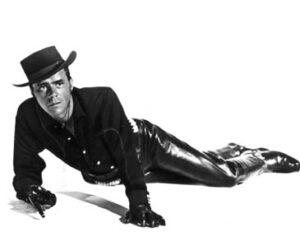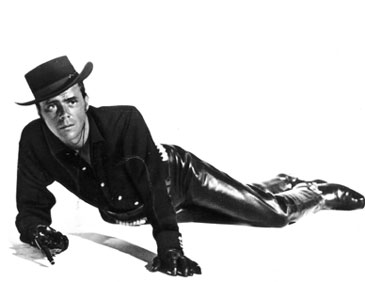
My discovery of Dirk Bogarde’s films is one of the great joys of my life, and not a day passes when I do not think of him, his movies – some seventy in total – or something he said in an interview or wrote in the twelve memoirs and novels he penned during his later years. Though, he may not be familiar to the American public for two reasons: Dirk spent most of his life in Europe, and didn’t much like Hollywood. Both virtually guarantee failure in this country.
The first Hollywood film Dirk made was the underwhelming Song without End: The Story of Franz Liszt (1960). The film’s director dropped dead of a heart attack during production, and the final release flopped. Dirk went back to Europe and never again attempted to court Hollywood, whose obsession with money and profit was a fatal turn-off for him. Dirk was a gay man in a time when homosexuality was illegal in his homeland (the U.K.) and simply not tolerated in Hollywood.
At that time— the late 50s, early 60s— sleaze was starting to sell, and gay rumors were finding their way into print in the ever-expanding tabloid press. Certainly the Anglo-American media would have wasted no time blowing the cover on Dirk and his relationship with live-in “manager” Tony Forwood, with whom he’d live until his death in 1988. In 1968, Dirk and Tony set up house in a rural village in the South of France where they were safe from the media glare, in a country free of the Protestant prejudices Dirk so vocally loathed.
But I’m already ahead of myself.
Dirk had been an intelligence agent during WWII and had been present at the liberation of Bergen-Belsen. Upon returning to England from the war Dirk set about getting his act together and appeared in a string of rather banal comedies that, for whatever they lacked in substance, made Dirk one of the biggest stars in England. He was, as it was often phrased, “The Idol of the Odeons,” and developed a huge following of young female fans, and one suspects, a few male ones, too.
Throughout the 1950s, Dirk remained Britain’s top heartthrob, and his films were smashing successes. Between 1953 and 1959, Dirk was one of the top-earning box office stars in England, and for that entire six-year run was never out of the top 5 (he was #1 in ’55 and ’57). Dirk treated his fame more or less as a joke, and refused to court his growing image as Britain’s Rock Hudson, as he demonstrated in 1961, when, just 39 years old and still very much a bankable star, he starred in the decidedly queer Western The Singer Not the Song. The film finds our hero (rather, anti-hero) stalking the sun-blanched streets of a Spanish village in crotch-hugging leather pants and a gambler hat, a gun in one hand, and a riding crop in the other, ready to mete out vengeance on anyone who crosses him. The bandit Anacleto, Dirk’s character, keeps the whole town in fear of his riding crop and caustic zingers. Gun, not so much. He meets his match with the village priest, played by John Mills, who delivers a performance so thoroughly unconvincing that to call it wooden would be, to quote Joan Collins, an insult to trees.
The film isn’t great, but what it lacks in verve it makes up for in Camp. One of my favorite scenes in movie history is Dirk attending a church service in his leather pants without a hint of shame. In another scene he holds a white cat, which he gently, contemplatively strokes, his hands encased in black elbow gloves. Dirk fumes. Pussy purrs. According to sources, Dirk’s quasi-comical treatment of the role was his revenge for John Mills being cast as the priest. He’d promised the studio that if John Mills were chosen he would make life miserable for everyone involved. Mills was cast, Dirk stewed, and the film bombed at the box office, though it is still one of the most unique movies ever made and one of the first to be so overtly homosexual. The film’s director Roy Ward Baker later reported that the black leather pants had been Dirk’s idea. As if wanting to make sure the deed was done, Dirk had the pants made himself in Rome, making revenge, for Dirk, sweet. At the very least Dirk must be given some credit for his bravery, taking a role that he must have known would not help his career.
Dirk’s reputation as a matinee idol was effectively finished off later that year when he starred in Basil Dearden’s gay thriller Victim, in which Dirk plays a respected, married London lawyer who’s living a double life. In the climactic confrontation scene, Dirk’s character, Melville Farr, admits to his wife, played by Sylvia Syms, that he has been ensnared in a blackmail scandal, and that he has, in fact, had a sexual encounter with a young man. “I wanted him!” Farr shouts as his spouse looks on in horror.
Victim, filmed in just ten days, fared well at the box office given its subject matter. Moreover, it is significant for being the first English language film to deal with homosexuality as a topic (even the first to feature the word “homosexual”) and the first to treat the subject in a respectful, largely sympathetic manner. The film’s dialogue expressly calls out the continuing gay criminalization laws in Britain as enabling extortion, and the film is widely credited with helping to precipitate the passage of the Sexual Offences Act of 1967 which finally decriminalized homosexuality in Britain.
Dirk’s fall from the marquee was complete: The Singer Not the Song and Victim had been a coming out of sorts, a virtual one-two punch, and never again was he as popular with the British public as he had once been. Meanwhile, Dirk continued to star in films with gay characters and gay directors throughout the 60s and 70s, most notably with Luchino Visconti and, less notably, with Fassbinder. His collaboration with Visconti on Death in Venice (1971)— Dirk’s last major contribution to cinema— resulted in what is often seen as his finest performance as an actor, a feat doubtless aided by Visconti’s majestic direction, and the film’s score which relied heavily on Mahler’s haunting Third and Fifth Symphonies.
Dirk explains in his memoirs that Visconti had not given him a script for the film. He’d just tossed Mann’s novella at him and told him to read it. Then he told Dirk to go out and get all of Mahler’s records and listen to them: then he would Get It. Dirk also recounts Visconti’s fascinating tale of how Thomas Mann’s story had come into being. He says Visconti told him that Mann had encountered Mahler on a train from Venice to Munich. Mahler, who appeared to be in quite a state, told him of the shattering episode he’d just experienced in Venice: the encounter with youth and death. Mann wrote up the story. Dramatic stuff.
I couldn’t help but think of the creative strand that ran through these individuals going back nearly a century: Mahler-Mann-Visconti-Bogarde. Four homosexual men from four different generations and fields of creativity, achieving a creative synthesis across time, to make this beautiful work of art.
He might not have been famous in America, or enjoyed the massive success of other stars of his day, but there’s no denying that Dirk Bogarde left an artistic legacy of quality and courage that few actors have. His legacy should be respected, discussed, and preserved for future generations. Maybe now, the former matinee idol, can get the fame and recognition he truly deserves.
Other classic Dirk performances: The Spanish Gardener (1956), The Servant (1963), Modesty Blaise (1966), The Damned (1969), The Night Porter (1974), Despair (1978), Daddy Nostalgie (1990).
 Erik Lewis is a native of the South. He spends most of the year on travel. You can learn more about Erik and his work at his website, here.
Erik Lewis is a native of the South. He spends most of the year on travel. You can learn more about Erik and his work at his website, here.






